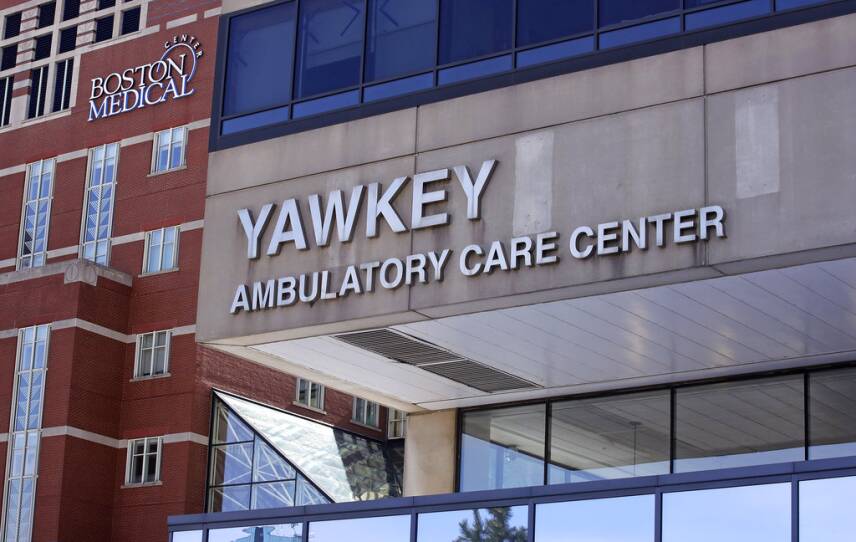Boston Medical Center changed its policy of serving as an ad-hoc safe harbor for migrants last week. Some local officials and advocates say they saw that change coming.
Monique Tú Nguyen, executive director of Boston’s Office of Immigrant Advancement, told GBH News that city officials had worried that the hospital would not be able to sustain its efforts as demand on the state’s emergency assistance system kept increasing.
“We were aware that they would have to start turning people away if it compromises their operation,” said Nguyen. “But we weren't sure of the timeline of when they were going to start that.”
The number of migrants — including pregnant women and children — who have been arriving at Logan Airport is surging to levels the state is struggling to meet. Fleeing from violence and political turmoil in Haiti and South America, migrants often don’t know where to turn, and have sought out help in hospitals, police stations and local libraries. Even some migrants who arrived in Massachusetts months ago end up forced back into the cycle of uncertainty due to unstable housing conditions .
Boston Medical Center, located in the South End, is one of the few places in the city that’s open 24 hours a day. It has sheltered hundreds of migrants for the past 18 months. But last week, hospital officials changed its policy to prohibit migrant families from staying at the facility unless they needed medical attention.
Hospital President Alistair Bell said in an email to employees on Monday that the change was prompted after 131 people were sheltered at the hospital during a single night last week, with the majority not needing medical help.
In the email obtained by GBH News, Bell said the number of migrants were affecting hospital operations and response to emergencies.
Bell said the jump in numbers “occurred despite the state’s opening a temporary shelter for families at Joint Base Cape Cod, as well as a Welcome Center in Allston to link families to shelter.” He said the hospital appreciates the state actions but “unfortunately short and longer term shelter resources continue to fall substantially short in the face of this growing humanitarian crisis.”
He added: “hospitals are not designed as a shelter.”
Amid the recent crush, some migrants were directed from Boston Medical Center to Logan Airport, where State Police then worked with local organizations to find more suitable accommodation, according to Massport spokesperson Jennifer Mehigan.
“It makes no sense to me,” Mehigan said. “The airport is not an appropriate place to house families. We don’t have the resources.”
Nonprofit Greater Boston Legal Services has fielded calls from BMC staff to help migrants navigate the emergency assistance system.
“Boston Medical Center has been saying for a long time that they needed more help from the state and it just got too overwhelming,” said Liz Alfred, staff attorney for their housing division. “That's what I think happened: they didn't get enough of the help that they needed.”

Alfred said that on occasion, BMC staff trying to get families help with the emergency assistance program meant “physically putting them into a cab and sending them to the Executive Office of Housing and Livable Communities.” She said there were times when “the office would just send them back to BMC” if they had an issue with their shelter application. The state and the hospital didn’t respond to questions about this scenario.
There is no question that the situation is growing more urgent by the day. As a right-to-shelter state, Massachusetts is legally obligated to provide eligible families shelter through the Emergency Assistance program. Nearly 70 municipalities across the state are hosting families through the program, state officials say.
The state doesn’t have an exact number for the amount of migrants flowing into Massachusetts, but each month, individual nonprofits have reported helping at least a few hundred people to GBH News. The shelter system had to expand each month since September of last year “in order to meet increased need,” according to a spokesperson for Gov. Maura Healey.
Three weeks ago, the state activated the National Guard to oversee a facility for migrants at Joint Base Cape Cod. As of Wednesday, 54 families were residing there.
“We have not occupied 60 units to date, but we do expect to in the future,” said Timothy McGuirk, a spokesman for the Executive Office of Public Safety and Security.
Since late 2022, the governor’s Executive Office of Housing and Livable Communities added more than 1,000 temporary hotels and motel units for use by the Emergency Assistance program. As of Wednesday, 1,226 migrant and resident unhoused families have been placed at sites statewide, according to state data .
“Due to a critical shortage of available shelter beds and an increase in demand, the state has had to use hotels and motels as a temporary, last resort to ensure families have safe housing,” said Healey spokesperson Karissa Hand in a written statement.
In June, the state opened the first welcome center for unhoused residents and migrants at the Brazilian Worker Center in Allston. Migrant families go through intake there, and if they qualify, can go to temporary housing. The state is in the process of onboarding Chelsea-based La Colaborativa as an emergency assistance provider.
“The major challenge to getting people into the system is, I think, the fact that the EA system doesn't have enough space,” Alfred said. “They [the state] are desperately looking for places to put homeless families, no matter where they're from.”
She said the challenge for migrants is proving their Massachusetts residency and having a place to stay while that process plays out.
In response to a request from state Rep. Peter Durant, a Republican from Worcester, asking for the costs associated with housing migrant families, Healey’s office wrote that the “uptick of newly arrived families, coupled with “challenging housing market conditions” have resulted in a “sizable increase” of families seeking shelter in the Emergency Assistance system.
State officials declined to answer questions about how much the state is spending on the 38 hotels and motels providing emergency shelter for migrant families across 28 municipalities.
“As a consequence of this, the shelter system is strained,” Healey’s response said, “and we are struggling to not only find physical shelter space, but also shelter providers capable of efficiently and effectively connecting families with the robust services necessary for child and family health and well-being and long-term stability.”
Boston city officials say they have stayed in contact with BMC throughout the yearlong process of migrant arrivals, and also helped 121 families in the past six months through its Office of Neighborhood Services.
Boston contracts with nonprofit Neighborhood of Affordable Housing and other groups to help place into hotels in the short-term. Nguyen calls “stop-gap situations” to put people up for a couple of nights or a weekend, when they don’t have emergency assistance shelter. Nguyen says she doesn’t think the situation will remedy overnight, but says the state has plans to expand its emergency assistance system.
“I have faith that it will smooth out over time,’’ she said, “especially as more organizations are resourced and stepping into the fold — that these uncoordinated moments will become less and less.”









